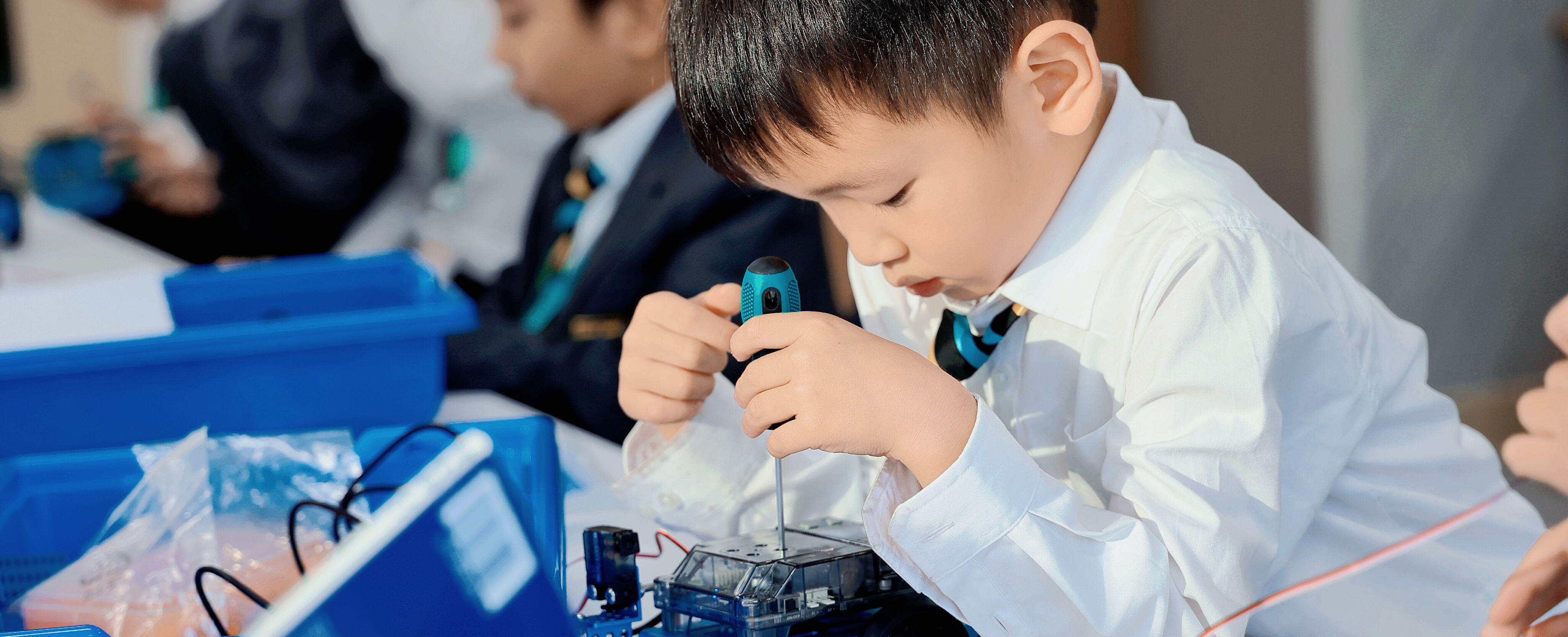
As observed by Chinese mathematician Hua Luogeng: Maths is everywhere. It shapes every part of the grand universe: from the tiniest particles to the design of rockets, chemical changes, the movement of the Earth, and innumerable other aspects of everyday life.
Maths celebrates the spirit of reason and empowers those who study it to maximize their capacity for rational thinking. And in an economy in which technology and data are playing an increasingly important role, logic, fluency in numbers and proficiency in computation will prove to be highly valued assets.
At Hiba Academy Nantong, we will help our pupils see the world from a mathematical perspective, approach problems with analytical thinking and express their solutions in the language of maths. While we want our pupils to think rationally and logically about concrete facts, we also hope that they will develop the ability to think in the abstract and ultimately develop a genuine appreciation of the elegance and beauty of mathematics.
The essence of the bilingual mathematics curriculum at Hiba is not simply to let pupils learn and solve mathematical problems in two languages. Rather, it is a combination of two distinct sets of thinking patterns and practices. Following their comparison of the Chinese and English curricula, our team of experienced teachers will carefully combine the respective strengths of the two while considering our pupils’ skills and language proficiencies. This will result in an integrated teaching plan.
Teaching will be closely linked to other subjects and areas of pupils’ personal development. They will acquire solid mathematical skills and knowledge while improving their ability to think, analyze, implement and innovate. In terms of content, they will learn the concepts and theories about numbers, shapes, algebra, geometry and a greater focus on statistics and probability compared to other curricula, as well as the application and extension of mathematical principles. All these elements will be delivered scientifically and rigorously as we encourage autonomous exploration, creative skills and the courage to question.
At our sister school, Hiba Academy Shanghai, for example, grade 4 pupils learn statistics by building the connection between maths and real-life circumstances. The US presidential election provided a useful teaching tool for this. Once their curiosity and intellectual interests are stimulated, pupils are encouraged to think about the importance of conveying information in quantity. After acquiring basic methods of collecting and processing data, pupils are divided into groups to brainstorm and decide a new topic of interest that each group wants to investigate further. The topics could be the links between people’s personal characteristics and their star sign or comparing the rankings of singles by the Beatles and the Chinese band Beyond, to name just a few. Through close communication and cooperation, a team of pupils collects and analyses data from questionnaires and presents their findings in class. Pupils field questions from their classmates in an active, low-pressure setting. Groups summarize key points and mathematical methods at the end of their presentation while teachers share comments on the pupils’ group work to ensure they have achieved an overall mastery of the material. Throughout the entire process, Hiba pupils are encouraged to be active learners. They have fun as they learn how to collaborate and develop their leadership skills.
Mencius said in his classic work Gaozi: “The great end of learning is nothing else but to seek for the lost mind”. Similarly, Socrates once said, “Education is the kindling of a flame, not the filling of a vessel”. These two great philosophers and educators living respectively in the Eastern and Western world more than 2,000 years ago expressed similar interpretations of the essence of education, which is to discover one’s inner mind and induce the individual to become their best self. Respecting individuality is an important Hiba education ethos, building on solid philosophical, educational, and psychological grounds. It is manifested through differentiated teaching and personalized learning.
At Hiba Academy Nantong, our teaching team will recognize and respect the differences in each pupil’s unique characteristics and emotional development, while supporting them to discover, accept and express themselves. We will plan all teaching activities according to their learning patterns, current levels and capacities. We will ensure differentiation through various methods, selected teaching content, flexible grouping, varied assignments and continuous and diversified assessment.
In Hiba Academy Nantong’s curriculum, the importance of bilingual mathematics is self-evident. We will provide ‘pupil-centred’, ‘bilingual teaching’ and ‘differentiated teaching’ to help pupils develop the mathematical skills they need to thrive in an ever-changing world.
Contact Us
Contacts:Sammi Gu
Hotline:0513-8919 0666
Telephone:177 1485 5368
Email:admissions.hsn@huilieducation.cn
Website:nantong.hibaacademy.org.cn
Founding Office Address:
China-Austria Eco-Park, Su-Xi-Tong Science and Technology Industrial Park, Nantong
School Address:
66 Haide Road, Su-Xi-Tong Science and Technology Industrial Park, Nantong, Jiangsu